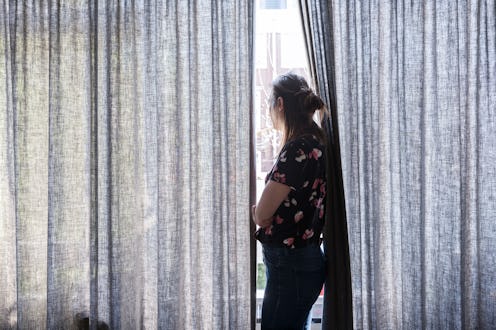Health
UK Helplines & Resources For Those Experiencing Domestic Abuse
Here's where to turn to if you're in need of help.

Trigger warning: This article contains references to domestic violence, as do many of its outbound links.
On Jan. 4, the government announced the third national lockdown in England, with Scotland, Wales, and Northern Ireland already in similar situations. While this is seen as the best option to curb the spread of the coronavirus, a number organisation have highlighted how dangerous lockdown can be for those experiencing domestic violence.
In May 2020, two months after the first lockdown began in England, Refuge reported a 957% increase in web traffic on their site and a 66% increase in the number of calls to their helpline. Three months later, Women’s Aid published a report in which they spoke to women living with their abuser during lockdown. Of those women, 61% said the abuse had worsened.
In September 2020, the government pledged £30 million in funding to go towards supporting survivors and their families during COVID-19. In addition, the Domestic Abuse Bill is finally going through the House of Lords, which commits to building a better understanding of domestic abuse in all its forms.
However, for those currently experiencing abuse, these changes are not coming soon enough, and knowing where to turn for information or finding someone to speak to is of the utmost importance.
These organisations and hotlines can offer practical advice and a listening ear while prioritising your safety and discretion.
Resources
Refuge
Refuge helps thousands of people everyday by offering advice, finding new homes, and advocating for people who have experienced abuse. Their website has information on recognising abuse and the different support available to you.
Women's Aid
The Women’s Aid website has a whole section on COVID-19 and why lockdown may pose a threat to you. They work closely with survivors to establish how best to get you to safety and have a handbook which offers advice on practical matters like housing and speaking to the police.
Galop
Galop is the LGBTQ+ anti-violence charity. They offer confidential support for people who have experience sexual abuse and domestic violence and also have a dedicated Trans Advocacy Service.
Southall Black Sisters
Southall Black Sisters is a not-for-profit, secular and inclusive organisation that focuses on gender-related violence and have campaigned for proficient support services that allow people to leave their abusers. They have a resource centre in West London but work nationally.
Safe Lives
Safe Lives works with organisations across the country to provide safe and effective support for survivors. Their website has resources on the different types of abuse and the places to get immediate support.
National Domestic Violence Hotline
The National Domestic Violence Hotline is a discrete search engine that will help you find the answer to questions like “what are the different obstacles to leaving” and “what is gaslighting.” You can use their website in incognito mode and it has information on immigration and finding shelter too.
Respond
Respond supports people with disabilities who have experienced abuse or trauma. Their blog has information on the pandemic and how it may affect your situation, places to turn to for immediate help, and therapy services you can contact.
Stonewall
Stonewall is a leading charity that advocates for LGBTQ+ rights. They have a number of resources on their website about what abuse is, red flags to look out for, and the myths and barriers often associated with abuse.
Ashiana Project
The Ashiana Project supports people aged 16-30 who are at risk of domestic abuse. They work closely with people from South Asian, Turkish, and Iranian communities offering shelter, advice, and support. They also have counselling and youth services.
Rise
Rise is based in Sussex and advocates for people who have been affected by domestic abuse. They have resources for young people and children and focus on the impact abuse can have on your mental health.
Cassandra Centre
The Cassandra Centre raises awareness for domestic abuse in young relationships. Their website has information on counseling, workshops to build community, and free meal delivery services. During 2020 they have aspired to bring people together so you know you’re not alone.
Helplines
National Domestic Violence Helpline
You can call the National Domestic Violence Helpline 24 hours a day, seven days a week, on 0808 200 0247.
They also have a live chat function on their website which is operated on Monday to Friday 3 p.m. to 10 p.m.
The Police
The non-emergency police number is 101 and is open 24 hours a day, seven days a week.
Galop
You can call Galop on 0800 999 5428 between Monday to Friday 10 a.m. to 5 p.m. and on Wednesdays and Thursdays it remains open until 8 p.m. 1pm to 5 p.m. on Tuesdays is the trans specific service.
Similarly, you can email advice@galop.org.uk for advice or use their online chat function on their website from 5 p.m. to 8 p.m. on Wednesdays and Thursdays.
National Centre for Domestic Violence
The National Centre for Domestic Violence has a hotline. You can call 0800 970 2070 or text NCDV to 60777.
You can also reach them by email on office@ncdv.org.uk.
Victim Support
The Victim Support Supportline is free on 0808 168 9111 and open 24 hours a day, seven days a week.
They also have a live chat on their website which is open 24 hours a day, seven days a week.
Women’s Aid
You can reach a Women’s Aid support worker on helpline@womensaid.org.uk.
They also have a live chat on their website and a forum where you can speak to other survivors.
Domestic Violence Assist
You can call Domestic Violence Assist on 0800 195 8699.